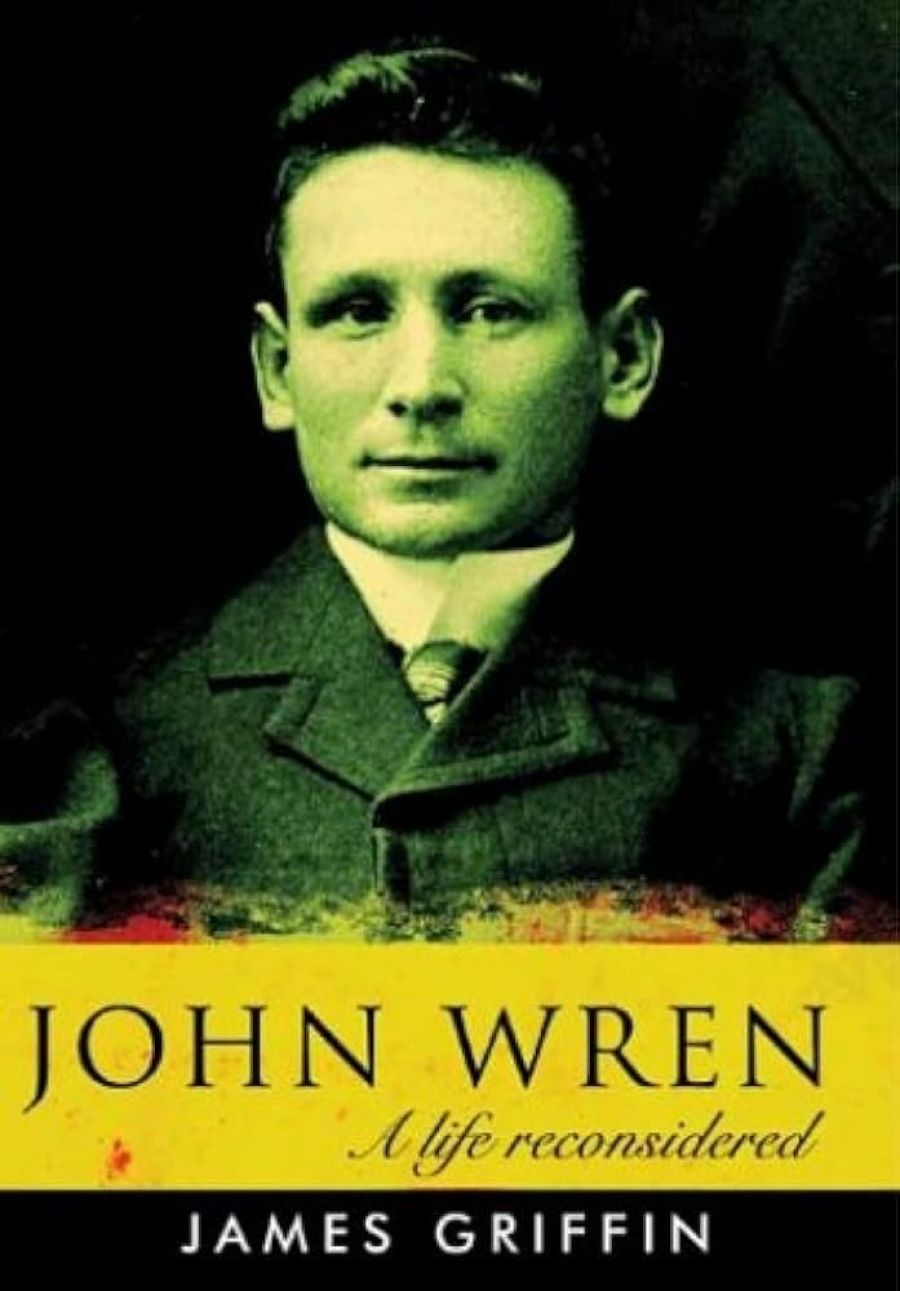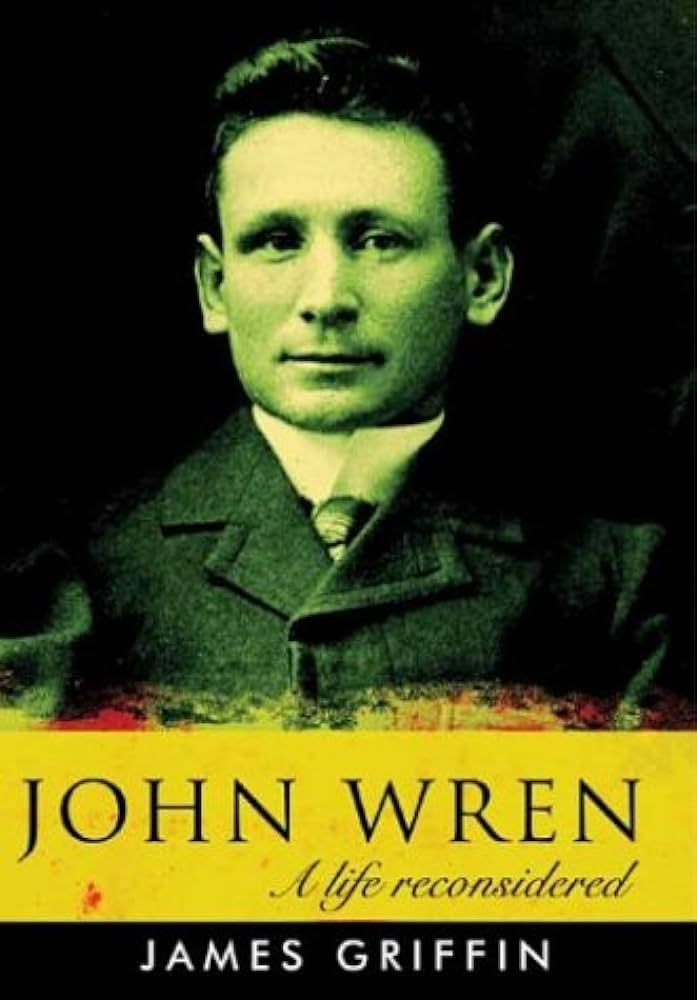
- Free Article: No
- Contents Category: Biography
- Review Article: Yes
- Article Title: The House of Stoush
- Online Only: No
- Custom Highlight Text:
The last institution of old Collingwood, the Collingwood Football Club, is poised to take flight from yuppified terraces in the former industrial suburb or new headquarters, on the site of what was once John Wren’s motordrome, Olympic Park. Now is a perfect moment in which to read this intriguing story of the one-time patron of Collingwood’s football, politics and gambling – Its masculine working-class culture, more or less. Published fifty-one years after Wren’s death, will Griffin’s biography finally allow the ghosts – not of Collingwood, but of its fictional shadow, the Carringbush of Frank Hardy’s Power Without Glory (1950) – to rest? Probably not.
- Book 1 Title: John Wren
- Book 1 Subtitle: A life reconsidered
- Book 1 Biblio: Scribe, $60 hb, 477 pp
- Book 1 Cover Small (400 x 600):

- Book 1 Cover (800 x 1200):

Griffin reconsiders the life of a sharp-witted Irish Catholic boy from Melbourne’s poorest nineteenth-century suburb. The young Wren, like Hardy’s character John West, ran an illegal totalisator. Unlike West, he then grew into a loving family man, a great and anonymous donor to charity, and a pioneering entertainment mogul. Griffin’s is not the first attempt at rescuing Wren from the fantastic world of Carringbush. In this book, he digs far deeper than did predecessors, such as Hugh Buggy and Niall Brennan, to track down key archival sources. His meticulous research misses the odd published article, but minor gaps don’t lessen the overall authority of the portrait. He scours court records and personal papers for details. An integration of genealogical sources and some rare interviews enrich the tale. Griffin is able to tell us that working-class Irish Catholics Wren’s parents may have been, but they were also landlords and owned several houses in Collingwood. The imprisonment and flogging of Wren’s brother, Arthur, is here analysed in detail, the impact on a young John Wren queried and Arthur’s later exemplary life given fulsome exposure. The raids on Wren’s illegal gambling shop are recounted blow by blow.
For the first time, we also get a broad summary of an older Wren’s complex and vast business empire. This included almost complete control over horse racing in south-east Queensland, and a network of pony and trotting tracks in several states. He had interests in mining, and in theatre and film (including a pioneering role in Australian sound film). His most reliable money-spinner probably remained ‘The House of Stoush’, the old West Melbourne stadium, and its inter-state counterparts, where Wren and Dick Lean promoted boxing and, later, professional wrestling, complete with evil protagonists who regularly hid weaponry under the ring.
One by one, ‘Wrennite’ Labor politicians are dissected by Griffin, to the conclusion that, whilst Wren may have exercised broad influence in Victorian Labor politics, he could not have pulled all the strings. But then, neither could anyone else in the Labor movement. Politicians certainly feared his influence and, since in politics perception is all, we do have to acknowledge that Wren retained considerable influence in Labor ranks. The major threat that state politicians posed to Wren’s business lay in their power to reduce the number of race meetings allotted to his tracks and to regulate trotting and pony racing. Wren consistently defeated such proposals, and it seems probable that in the process he called in the many debts owed to him by Queensland and Victorian ALP figures. Wren’s obvious connections to Country Party figures could have done with more exposure. Of Wren’s life-long associates, perhaps only Robert ‘Sugar’ Roberts, the cigar-puffing mayor of Collingwood, comes through as more than shadowy. The Wren family filled a unique place in Melbourne’s social hierarchy; yet of family life in this upper-class, inter-war Catholic milieu, surrounded by suburban Protestantism but with its ties still to the industrial inner city, there is the occasional flashing insight, but no sustained analysis.
Griffin eventually muses that he may have painted Wren in too kind a light. We ought to believe him. Staid little John West emerges as intrinsically less interesting than the colourful characters of Carringbush. But questions do remain about Wren’s business practices. His legal interventions deserve further review. In several cases mounted against his tote and City Tatt’s Club, hostile witnesses suddenly altered stories, got confused or simply did not show up. As Hardy’s novel began to surface around Melbourne, Wren took on Hardy with a criminal, rather than civil, libel charge. Why did this case turn solely on Hardy’s invention of Mrs West’s adultery? Why not test out his allegations about West’s corruption in court?
In undermining the West octopus, Griffin is at pains to demonstrate that Wren could not have rigged the 1904 Caulfield Cup, which his horse Murmur won. A Wren associate could not have driven the truck that injured champion South Melbourne footballer Bob Pratt before the 1935 grand final against Collingwood. Wren, as Griffin reminds us a few times, was no Al Capone. But a central thrust of Hardy’s narrative was not to portray West as a Chicago gangster but to depict an all-powerful and distinctively Australian capitalist system that duped the working class with opiate-like entertainments and corrupted the bourgeois proto-socialists of the ALP.
While this biography presents us with an unquestionably authoritative and lively reconsideration of John Wren, it returns at key moments to the yarn, however fanciful, of Frank Hardy, and eventually, to Hardy himself. Griffin is painstaking in his dissection of Hardy’s literary and historiographical shortcomings. In Griffin’s assessment, Power Without Glory does not deserve its status as a great Australian novel. Hardy, no doubt, would have disdained such bourgeois affectations as ‘great literary figure’ and would have been satisfied that his book has won over the oppressed masses. Despite Griffin’s damning analysis, credit ought still go to the research that lay behind Power Without Glory: Hardy wrote it at a time when very few academic historians took an interest in inner-Melbourne’s political history. Indeed, Hardy, some might argue, wrote poor literature but accurate history. The continuities between literary form and historical validity are more complex than Griffin allows.
Griffin has won wide respect for his pioneering, deconstructive biography of Archbishop Mannix. Not surprisingly, in this book, the sharpest portrait is again a hostile one: of Frank Hardy. And in Hardy’s wake at Collingwood Town Hall, standing no longer at the heart of proletarian life, but now a prized artefact of the gentrified inner city, Griffin composes an elegiac response to a passing world. On Hardy’s death, the old Victorian pile in Hoddle Street hosted a gathering of communists whose dream had vanished. The Trades Hall choir sang the ‘Internationale’, for that most Australian of popular writers. How different was Wren’s grand finale: held in St Patrick’s Cathedral, celebrated by a phalanx of clergy in an innocent’s white rather than death’s customary black, but with Mrs Wren and some of Wren’s children unfortunately absent.
It is unfortunate, too, that Griffin’s rich skills are often fixed more on Wren’s detractors and not the man himself. Wren’s enemies rendered themselves irrelevant to Australian life many years ago: empire loyalists who loathed his brief Irish identifications; Protestant bigots discomfited by Catholic wealth; Stalinist zealots bent on reconstruction of the working class. In the twenty-first century, does anyone care? Perhaps only his first antagonists, the anti-gambling crusaders, have survived. Today they target legal gaming tycoons rather than backstreet tote operators.
We now read of these old struggles with more nostalgia than anger. We can also hope that in future Wren’s wonderful world of urban spectacle, trots, ponies, films and wrestling will win more of the spotlight than the darkest recesses inhabited by John West. More likely, this fine biography will bring new readers to that old socialist realist swashbuckler, Power Without Glory. As anyone who saw the wrestling at the House of Stoush could attest, when fact and legend conflict we prefer the legend. John Wren perfected the sale of illusions, in films, gambling and wrestling. We all want to believe that the bad guy has hidden that lump of timber under the canvas – just in case he really has.


Comments powered by CComment